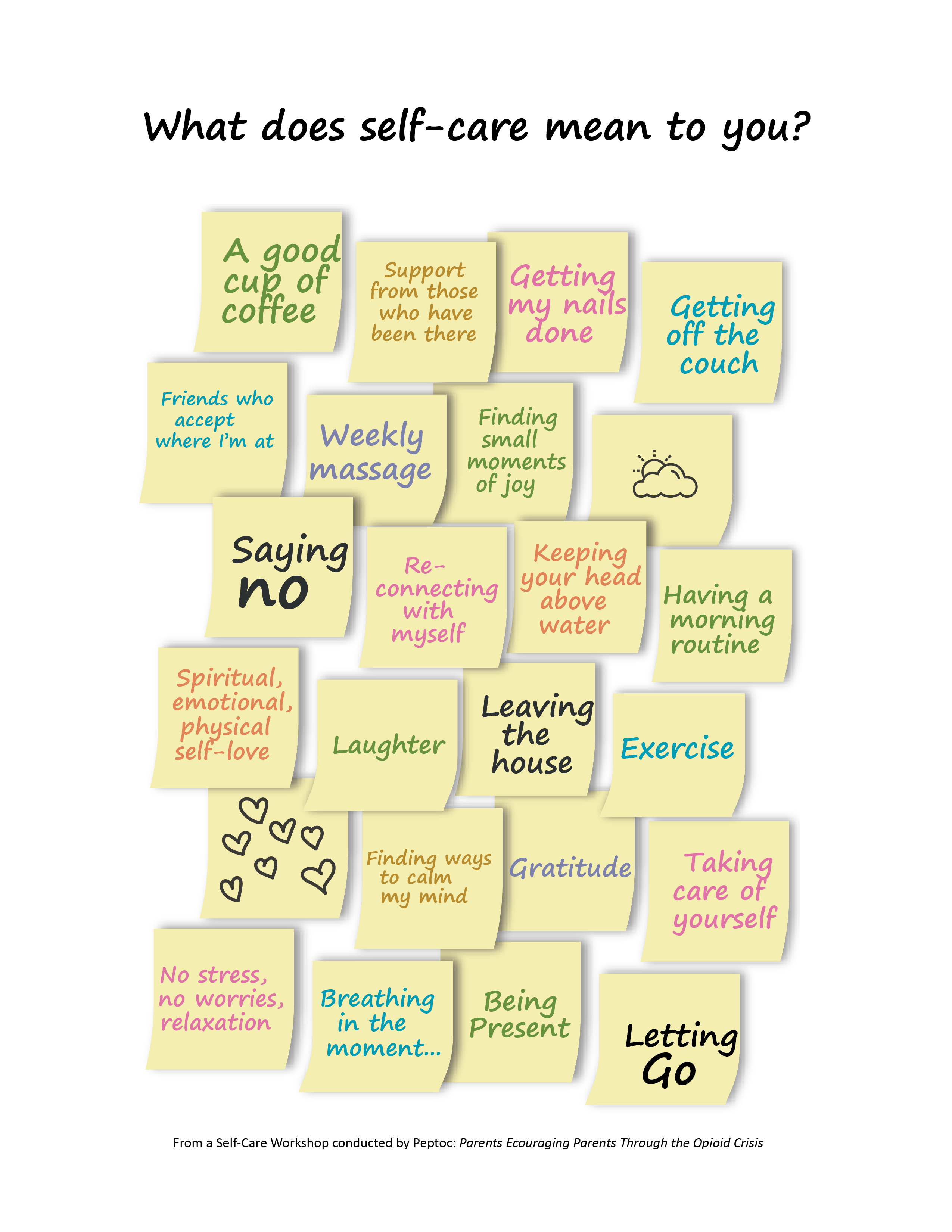Support for Yourself
Contents
WHAT CAN YOU DO FOR YOURSELF WHEN YOU ARE IN THE TRENCHES?
If you notice that you have stopped doing things that matter to you, take some time to reflect on the things you enjoy doing. Make a list. Look at your calendar. Reach out to a friend for a walk. This can be a shift that starts you into a more regular routine. You may not be ready to do everything on your list, but you can start with just one thing. Here are some additional things you may find particularly helpful:
PARENT/CAREGIVER EDUCATION GROUPS
Educate yourself. The more you understand about this illness and learn about the developing brain and addiction, the better equipped you will be to manage. Parenting groups that offer education can provide insight into the teenage developing brain and the effects substances can have, and they can offer new ways to approach, communicate, and stay connected to your young person.
You deserve happiness, sanity, your health, meaningful relationships, sleep. You need to know your own limitations, your triggers and stressors. It’s a process and you need time.
SSM Parent Tweet
PARENT/CAREGIVER SUPPORT GROUPS
It is an opportunity to find other parents who can hear and relate to what you are going through. Many parents find it harder to relate to friends and relatives whose experiences with their children are very different. It is also important to find a group you feel comfortable with. Often you can learn from parents whose struggles are more or less challenging experiences than your own. You may form friendships with them too.
Meeting with other parents [who get it] is important to talk through things, so you can hear each other out.
SSM Parent Tweet
It is important to find a support group that works for you. If your young person has a severe substance use disorder, you may feel alienated in certain support groups where other families’ problems seem relatively minor in comparison. In contrast, you may be shocked to hear the problems of others if your young person does not have a substance use disorder, or if you are not quite ready to accept the reality of what is happening. It is normal to change support groups throughout your journey.
We encourage you to talk to the group facilitator about the kinds of situations that the parents in the group are dealing with before you attend, so you can find the best fit for you.
COUNSELLING
There are several agencies that offer individual or family counselling. Being able to communicate one-on-one with someone and talk about your own personal experience can be very helpful. A good counselling experience can validate the intensity of your experience and offer helpful skills, strategies, and direction.
KEEPING A JOURNAL
Keeping a personal journal can be a good way to see change and progress over time. Some things in your journal might include:
- Count the gems: tracking small wins
- Vent: describe those days when things are not going well
- Be the observer: practice being observant and describe the details of what you are seeing. Practice being objective to give yourself a break from the emotion of the situation
- Make a list of ways to care for yourself
- Make a list of things you can control and things you cannot
- Set small goals and celebrate each achievement
REACHING OUT IN YOUR COMMUNITY
If you are feeling overwhelmed and exhausted, it can be more difficult to take care of yourself and your loved one(s). Slow down, rest, and when you are ready, reach out to others who can understand and validate your journey. Reaching out and communicating with your young person’s school staff, local police, or social workers can sometimes be helpful.
Be brave and reach out. Every challenging moment is a learning opportunity.
Meeting other parents and talking to one another is a gift.
SSM Parent Tweet
SETTING BOUNDARIES
Set flexible boundaries with your young person and accept that they will change. Sometimes you may find yourself needing to set firm boundaries. Sometimes you may feel like the passive parent. It can be scary but try it anyway. Get to know your limits and be kind to yourself in the process. You are doing your best.
Love never fails, but you need to have big boundaries.
SSM Parent Tweet
They have a journey and so do we. Do your own work. Your young person does not want to see you suffering because of them.
What boundaries are you working on?


